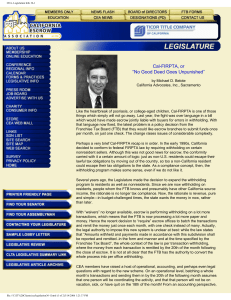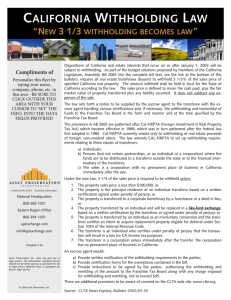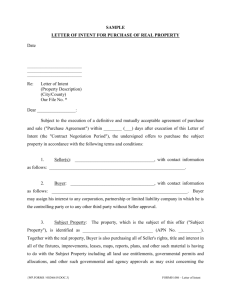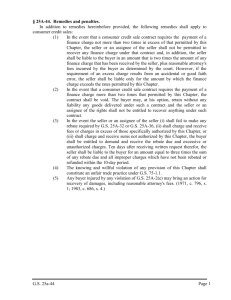Understanding Real Estate Property Related Taxes in Escrow
advertisement
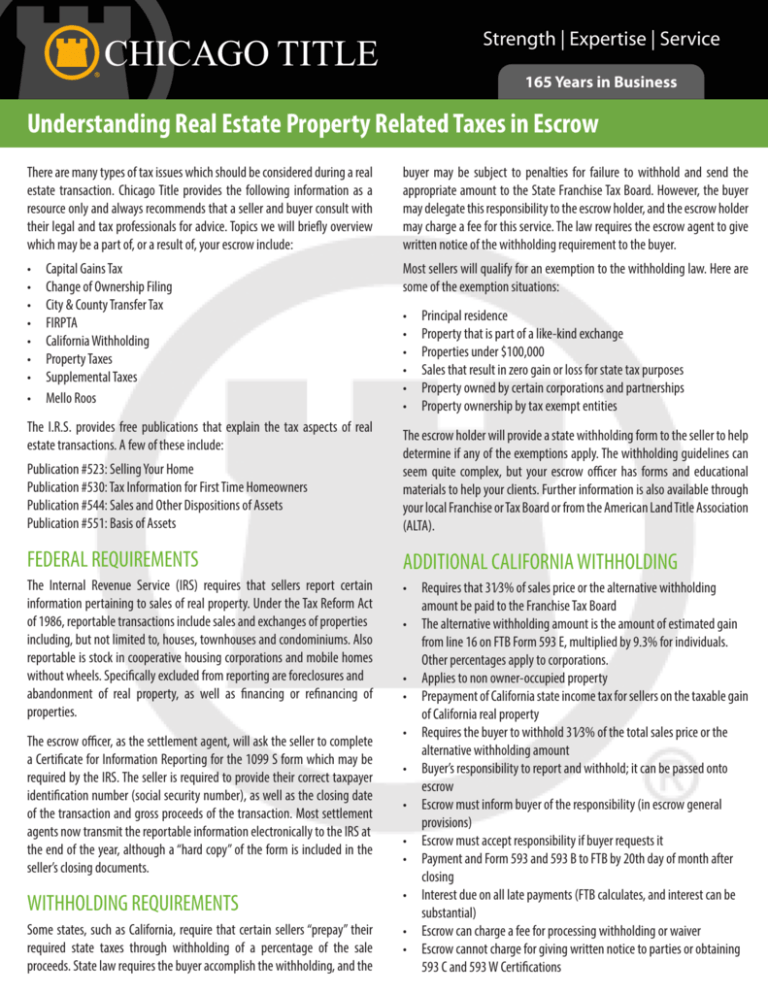
Strength | Expertise | Service 165 Years in Business Understanding Real Estate Property Related Taxes in Escrow There are many types of tax issues which should be considered during a real estate transaction. Chicago Title provides the following information as a resource only and always recommends that a seller and buyer consult with their legal and tax professionals for advice. Topics we will briefly overview which may be a part of, or a result of, your escrow include: buyer may be subject to penalties for failure to withhold and send the appropriate amount to the State Franchise Tax Board. However, the buyer may delegate this responsibility to the escrow holder, and the escrow holder may charge a fee for this service. The law requires the escrow agent to give written notice of the withholding requirement to the buyer. • • • • • • • • Most sellers will qualify for an exemption to the withholding law. Here are some of the exemption situations: Capital Gains Tax Change of Ownership Filing City & County Transfer Tax FIRPTA California Withholding Property Taxes Supplemental Taxes Mello Roos The I.R.S. provides free publications that explain the tax aspects of real estate transactions. A few of these include: • • • • • • Principal residence Property that is part of a like-kind exchange Properties under $100,000 Sales that result in zero gain or loss for state tax purposes Property owned by certain corporations and partnerships Property ownership by tax exempt entities Publication #523: Selling Your Home Publication #530: Tax Information for First Time Homeowners Publication #544: Sales and Other Dispositions of Assets Publication #551: Basis of Assets The escrow holder will provide a state withholding form to the seller to help determine if any of the exemptions apply. The withholding guidelines can seem quite complex, but your escrow officer has forms and educational materials to help your clients. Further information is also available through your local Franchise or Tax Board or from the American Land Title Association (ALTA). FEDERAL REQUIREMENTS ADDITIONAL CALIFORNIA WITHHOLDING The Internal Revenue Service (IRS) requires that sellers report certain information pertaining to sales of real property. Under the Tax Reform Act of 1986, reportable transactions include sales and exchanges of properties including, but not limited to, houses, townhouses and condominiums. Also reportable is stock in cooperative housing corporations and mobile homes without wheels. Specifically excluded from reporting are foreclosures and abandonment of real property, as well as financing or refinancing of properties. • Requires that 31⁄3% of sales price or the alternative withholding amount be paid to the Franchise Tax Board • The alternative withholding amount is the amount of estimated gain from line 16 on FTB Form 593 E, multiplied by 9.3% for individuals. Other percentages apply to corporations. • Applies to non owner-occupied property • Prepayment of California state income tax for sellers on the taxable gain of California real property • Requires the buyer to withhold 31⁄3% of the total sales price or the alternative withholding amount • Buyer’s responsibility to report and withhold; it can be passed onto escrow • Escrow must inform buyer of the responsibility (in escrow general provisions) • Escrow must accept responsibility if buyer requests it • Payment and Form 593 and 593 B to FTB by 20th day of month after closing • Interest due on all late payments (FTB calculates, and interest can be substantial) • Escrow can charge a fee for processing withholding or waiver • Escrow cannot charge for giving written notice to parties or obtaining 593 C and 593 W Certifications The escrow officer, as the settlement agent, will ask the seller to complete a Certificate for Information Reporting for the 1099 S form which may be required by the IRS. The seller is required to provide their correct taxpayer identification number (social security number), as well as the closing date of the transaction and gross proceeds of the transaction. Most settlement agents now transmit the reportable information electronically to the IRS at the end of the year, although a “hard copy” of the form is included in the seller’s closing documents. WITHHOLDING REQUIREMENTS Some states, such as California, require that certain sellers “prepay” their required state taxes through withholding of a percentage of the sale proceeds. State law requires the buyer accomplish the withholding, and the Understanding Real Estate Property Related Taxes in Escrow CA WITHHOLDING EXEMPTIONS FOR INDIVIDUALS • Property is seller’s principal residence under IRC 121 • Total sales price is $100,000 or less • The seller will incur a loss on the sale for California Income Tax purposes (must use FTB form 593 E) • Nonrecognition rules apply • Simultaneous or delayed exchange pursuant to IRC Section 1031 • Installment sales when the buyer agrees to withhold on each principal payment • The property is being involuntarily converted and will qualify for nonrecognition of gain for California Income Tax purposes under IRC Section 1033 CA WITHHOLDING EXEMPTIONS FOR NONINDIVIDUALS ONLY • • • • • • • • • Corporation Partnership Limited Liability Company (LLC) with certain requirements Tax Exempt Entity (church, charity, school, etc.) Sale by estates when the property was the decedent’s principal residence IRAs, Pension Funds, Insurance Companies The seller will incur a loss on the sale for California Income Tax purposes Simultaneous or delayed exchange pursuant to IRC Section 1031 The property is being involuntarily converted and will qualify for nonrecognition of gain for California Income Tax purposes under IRC Section 1033 FIRPTA – FOREIGN INVESTORS REAL PROPERTY TAXATION ACT • Requires 10% of sales price be withheld for foreign ownership • Applies to nonresident aliens of USA, including foreign partnerships, foreign trusts and foreign estates • Buyer’s responsibility to report and withhold, not the escrow officer • Exceptions under Internal Revenue Code (IRC 1034): Sales price not over $300,000 and buyer will use the property as principal residence • Seller can request a waiver or reduced withholding on Form 8288 B (tax identification number required) • Payment and Forms 8288 and 8288 A are due within 20 days of closing (tax identification number required) • IRS penalties are steep if forms and/or payment are received late Also required is the total purchase price, terms of sale and signature of the new owner. The reporting document is recorded along with documents evidencing a change in ownership. In California, the document is called a Preliminary Change of Ownership (PCOR), and it assists the local agency in identifying situations in which a property reassessment is allowed under Proposition 13. Penalties or fines may be assessed from the governing body for failure to file the document as required by state or local laws. The escrow officer will generally assist the client in completing the document and ensuring that it reaches the Recorder’s Office along with the other documents pertinent to the change of ownership. Some situations which appear to be a change of ownership are exempt from the filing of this type of document, including corrections to the record and status changes such as a change in vesting. TRANSFER TAXES Transfer Tax, often called Real Property Transfer Tax, is a tax collected by the County Recorder when an interest in real property is conveyed. It is paid at the time of recording, and is computed using the actual sales price. An amount, legislated by the state or county, is charged per $500 or $ 1,000 of the sales price. Although it is common for the seller to pay this tax, in some areas tradition dictates that the buyer and seller will split the payment. Many cities have levied an additional tax within their jurisdictions. In some counties, these taxes are collected by the County Recorder along with county transfer tax, but in other areas a separate check will be mailed to the city. Your escrow officer is familiar with the taxes required and will coordinate payment of the appropriate amount. PROPERTY TAXES Homeowners pay property taxes to their appropriate assessment, collection or franchise tax department in each county. A change in ownership or the completion of new construction could result in a change in the assessed value of the property and may result in the issuance of a supplemental property tax bill. Taxes are due on predesignated dates and become delinquent when not paid. Penalties are assessed for delinquent taxes. The yearly “tax calendar” varies by state. In addition to standard property taxes, many jurisdictions also contain special assessment districts, which may have been formed as a means of financing infrastructure. Bonds may have been sold to finance the infrastructure and the ultimate property owner continues to make payments on the principal and interest on the bond. The bond issues vary in size and term. Other special city and county districts may be assessed for a variety of purposes, including street lights and traffic signals, street maintenance, certain educational purposes, etc. CHANGE OF OWNERSHIP FILINGS When property changes hands, local government agencies require notice of change of ownership. At the local level, this would be any county office that assesses or collects taxes. Reporting a change in the ownership of the property allows the local jurisdiction to assess the tax liability for each The above information is provided by Chicago Title as informational purposes only and is not or may not be construed as legal advise. Please consult with a tax attorney or CPA to embark upon any specific course of action. Chicago Title makes no express or implied warranty respecting the information presented and assumes no responsibility for errors or omissions.
